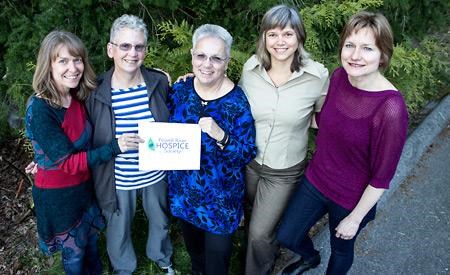Board members from a newly formed society are starting the work of raising money and awareness about the state of palliative hospice care in Powell River.
“We’ve been meeting for a year now, working hard to get set up in both legal and practical ways,” said Heather Baldwin, Powell River Hospice Society president. “We need some funding to start operating effectively.”
While the subject of palliative care can be complex, at its most basic it means providing comfort care for an individual at the end of life through managing pain or other medical symptoms and also providing social, emotional and spiritual support which aims to help improve quality of life and death. This care can happen in a person’s home, at a hospital or long-term care facility or in a specialized hospice. In Powell River care takes place in either a person’s home or at Powell River General Hospital and includes visits from trained hospice care volunteers, home care nurses and from pain care specialists.
The group considers death a natural and meaningful part of life’s journey, Baldwin said.
A well-established group of hospice care volunteers was previously organized through the hospital to provide one on one visits and counselling. But near the end of 2013 Vancouver Coastal Health (VCH) cut funding for the person coordinating and training volunteers. That is when it became apparent that the community needed someone to organize a community-based hospice society, one like many other communities in the province already had.
“It’s been more than a year and a half that our group has not had a paid coordinator,” said Sandra Tonn, who was one of the trained hospice volunteers and is now vice-president of the society. Over that time volunteers have continued their work without being coordinated by the health authority and have been waiting to see if that decision would be reversed, Tonn said. “That was the first seed that brought us together to start talking about forming our own independent society,” she added. “It’s common in other cities and is not the hospital’s job typically, although that is the way it had functioned here.”
Tonn added that the society recently held a meeting for previous volunteers and many are interested in joining the new society. More than a dozen volunteers have joined and more are expected as word spreads.
Baldwin said the society is planning to hold a volunteer training session in the fall and the society’s directors have experience and background in hospice and palliative care.
Sandy McCartie, society secretary, said having an independent group will strengthen the community in the long term. “Hospice societies are usually very grassroots,” McCartie said.
The society has a five-member board comprised of Baldwin, Tonn, McCartie, treasurer Kim Barton-Bridges and director Dr. Susan Horsfall. The society currently operates out of Horsfall’s office on Harvie Avenue. The directors are working on creating a community lending library located there.
They would like to hire a half-time coordinator to look after the volunteers and organize events when they have raised enough money.
Baldwin, who retired from her career in palliative care nursing, said the directors have been talking with other hospices and have been told that the activities of the society will not be sustainable on volunteerism alone. “It’s part of the dream,” she added.
That dream is an expansion of the one-on-one visits to include the creation of bereavement groups, therapy dogs, life review, art and music therapy, workshops, providing community resources and some day a hospice building, said Baldwin. She described the society as not solely to help those who are dying. It will also provide important support for family and friends of the deceased or dying and is committed to providing education and advocacy throughout the community.
“It’s a way to open up a conversation and say it is okay to talk about the issues that surround death, and not only that, but it’s good and a necessary part of life,” Tonn added.
There are not any bereavement groups for children and teens in Powell River to help them deal with their loss.
“Dying is just something that a lot of people don’t know that much about or know what to expect,” Baldwin added. “That’s something we can do—help people to deal with and understand it. Education is going to be a big part of what we can offer.”
The need in Powell River for palliative services is high, according to Baldwin. When she worked in the hospital in community care she found about half of home care nurses’ patients required palliative care services. “And those are only the ones we know about,” she added. “There are lots of people out there who just do not get connected to the system. It really depends on the family doctors to make the connections to get these people the help they need.”
To help raise money and awareness, the society is participating in Canadian Hospice Palliative Care Association’s Hike for Hospice from 1 to 4 pm on Sunday, May 3, at Willingdon Beach. The event kicks off National Palliative Care Week.
All money raised at the family-friendly hike will stay in the community to help the society get started and help sign up members.
Anyone interested in becoming a member, donating, helping out or training to be a volunteer can contact the society at 604.485.2171 or [email protected].
This story is part one of a three-part series about hospice care.



